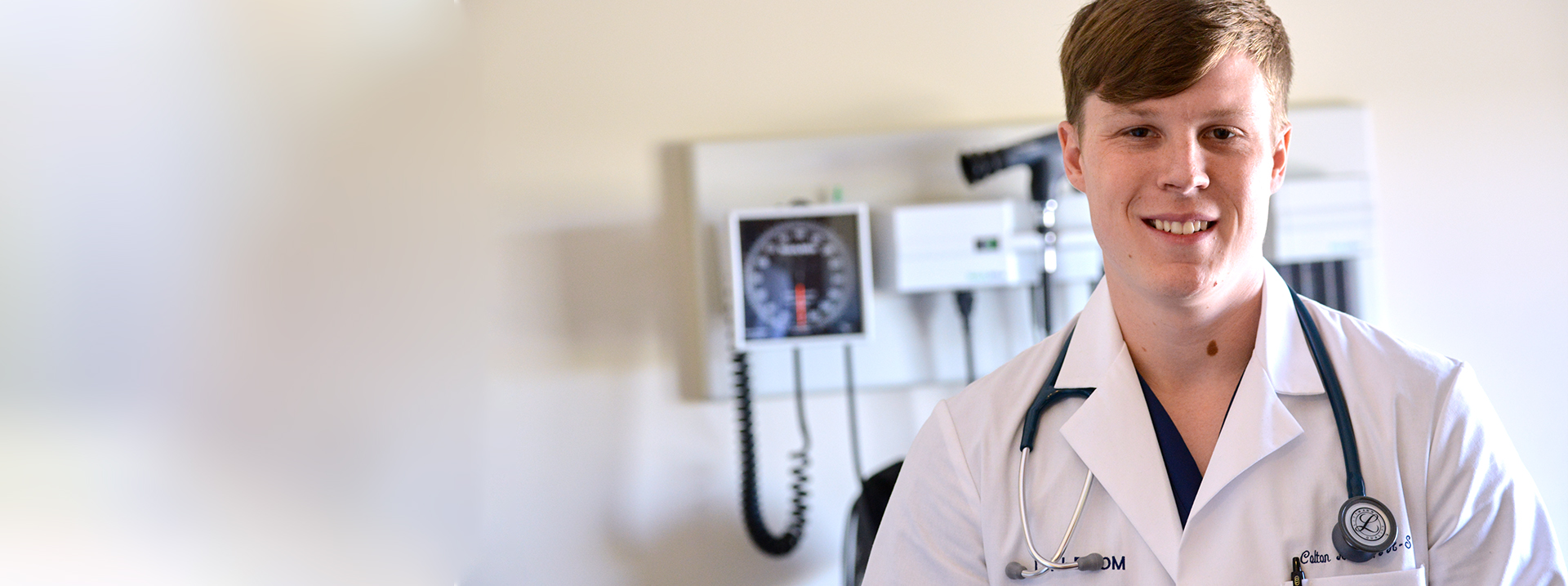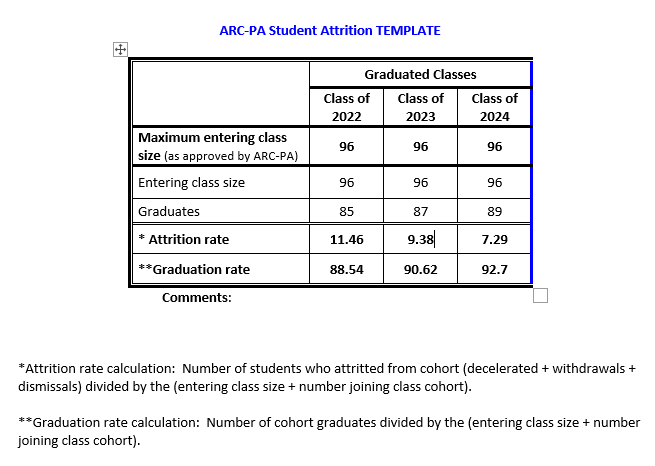
The Lincoln Memorial University-School of Medical Sciences Physician Assistant Program’s Mission is to educate future Physician Assistants to provide quality healthcare with an emphasis in primary care to the medically underserved of Appalachia and beyond.
Promote early and ongoing clinical decision-making skills throughout various learning experiences demonstrated in student performance in the clinical year.
Measured through: Preceptor ratings of students on clinical rotations.
Benchmark is set at 90%
Class of 2021: 95%
Class of 2022: 90%
Class of 2023: 94%
Class of 2024: 93%
To further assess this goal, the following statements were extracted from the preceptor survey.
Measured through: Preceptor ratings of students on clinical rotations.
Benchmark is set at 90%
Was the student academically prepared for the rotation?
Class of 2021: 99.5%
Class of 2022: 99.1%
Class of 2023: 99.3%
Class of 2024: 99%
Did the student exhibit growth during the rotation?
Class of 2021: 99.7%
Class of 2022: 99.7%
Class of 2023: 99.7%
Class of 2024: 100%
Overall preceptor grades are also monitored by the program to assess this goal, but performance is not disclosed here due to student privacy.
Create an atmosphere where integrity is valued, and professionalism is expected and modeled by students during the clinical year.
Measured through: Preceptor ratings of students on clinical rotations
Benchmark is set at 90%
Class of 2021: 98%
Class of 2022: 97%
Class of 2023: 98%
Class of 2024: 97%
Measured through: Preceptor evaluation qualitative data from rotations.
Benchmark for developing a theme is set at 5% of preceptor responses.
Class of 2021: Professionalism identified as a positive theme for all core rotations
Class of 2022: Professionalism identified as a positive theme for all core rotations
Class of 2023: Professionalism identified as a positive theme for all core rotations
Class of 2024: Professionalism identified as a positive theme for all core rotations
A combination of quantitative and qualitative data meets the goal of creating an atmosphere where integrity is valued and professionalism is expected and modeled by students during the clinical year.
Recruit, select, and matriculate a population of students with a diverse set of experiences, exposures, and ideas to promote an environment of knowledge sharing and drive innovation.
Lincoln Memorial University’s Harrogate PA Program is committed to matriculating students from its program-defined diverse populations (combination of Underrepresented Minority [URM], over age 30, first-generation, living in a Health Professional Storage Area [HPSA] or Medically Underserved Area [MUA]).
Measured through: Matriculation data demonstrating that LMU-Harrogate PA student matriculants represent a diverse population
Benchmark is set at 50% of matriculating students are from program-defined diverse population(s).
Class of 2021: 46%
Class of 2022: 48%
Class of 2023: 37%
Class of 2024: 53%
Class of 2025: 57%
Class of 2026: 54%
Lincoln Memorial University’s Harrogate PA Program is committed to matriculating students from the Appalachian Region (TN, KY, VA, NC, GA, AL, WV).
Measured through: Admissions data of matriculating students
Benchmark is set at 50% of matriculating students are from the Appalachian Region.
Class of 2021: 64%
Class of 2022: 58%
Class of 2023: 57%
Class of 2024: 55%
Class of 2025: 48%
Class of 2026: 52%
Lincoln Memorial University’s Harrogate PA Program is committed to matriculating diverse students and fostering a welcoming environment for all.
Measured through: Student DEI survey | Benchmark is set at 3.8/5, strength is ≥4.5/5
| First administered in 2023-2024 academic year | 2023-2024 | 2024-2025 |
| Perception of a welcoming environment: | 4.5/5 | 4.5/5 |
| Program inclusiveness | 4.5/5 | 4.5/5 |
| Welcoming cultural differences: | 4.7/5 | 4.7/5 |
Create and promote an atmosphere of early and ongoing respect for patients, regardless of their disability, gender, race, culture, age, socioeconomic, sexual orientation, and physical or mental abilities, and special health care needs throughout various learning experiences demonstrated in student performance in the clinical year.
Measured through: Preceptor Evaluation of Student data on standardized rubrics rate students as well prepared to work with diverse populations, including disability, gender, race, culture, age, socioeconomic, sexual orientation, and physical or mental abilities and special health care needs populations.
Benchmark is set at 90%
Class of 2021: 98%
Class of 2022: 97%
Class of 2023: 98%
Class of 2024: 95%
Data for student preparation throughout the program for working with diverse patient populations
Measured through: Student DEI survey | Benchmark was set at 3.8/5; strength at ≥4.5/5
| First administered in 2023-2024 academic year | 2023-2024 | 2024-2025 |
| I feel my PA program is providing sufficient training to allow me to provide competent, unbiased, cross-cultural healthcare to my future patients | 4.4/5 | 4.38/5 |
| Sufficient didactic year instruction/activities involving diverse populations were provided to prepare me to work with diverse populations: | 4.0/5 | 4.04/5 |
| OSCE/SIM activities sufficiently exposed me to diverse populations that prepared me to provide competent, culturally sensitive care to all patients | 4.0/5 | 4.0/5 |
Program Benchmark-Achieve a 90% five-year average for the first-time takers of the PANCE. Click the link below to view the report.
Five Year First Time Taker Summary Report
Exam Performance Summary Report
Renewed “Accreditation –continued” status by the ARC-PA with the next on-site review in 2025.
The statistics below are based on the 2023 National Center for Analysis of Healthcare Data (NCAHD) report.
Thirty-three percent of all Harrogate Physician Assistant graduates are employed in Tennessee.
Sixty-seven percent of all Harrogate Physician Assistant graduates are serving in underserved areas.

Upon completion of the LMU PA program in Harrogate, graduates will have proven competency in areas of medical knowledge, interpersonal communication skills, clinical reasoning and problem-solving abilities, clinical and technical skills, and professional behaviors required for entry into PA practice:
Medical Knowledge:
a. Demonstrate the ability to access, evaluate, and assimilate current medical research
b. Compose a medical research paper utilizing accepted standards for medical writing
c. Identify normal and abnormal findings on patient history and physical examination
d. Identify medical conditions based on etiologies, risk factors, pathology, and epidemiology
e. Manage medical, psychiatric, and surgical conditions using pharmacologic and non-pharmacologic modes of treatment
Clinical Reasoning and Problem-Solving:
a. Provide appropriate counseling regarding specific medical conditions
b. Recommend appropriate preventive screening and preventative care measures
c. Develop a complete patient-centered treatment plan based upon the patients’ medical conditions
d. Recommend appropriate pharmaceutical management for patients’ medical conditions
e. Correctly select and interpret laboratory tests and diagnostic study findings
f. Integrate clinical findings with diagnostic study data to formulate differential diagnoses
Clinical and Technical Skills:
a. Obtain the appropriate elements of focused and comprehensive patient histories
b. Obtain the appropriate elements of and properly perform physical examinations
c. Properly perform specific minor medical and surgical procedures
Interpersonal Communication Skills:
a. Appropriately document-focused and comprehensive patient histories and physical examination findings
b. Clearly communicate pertinent patient information in oral presentations and multiple types of note formats
c. Clearly communicate patient treatment plans and preventative care recommendations
d. Demonstrate appropriate body language and active listening skills during interactions
Professionalism:
a. Demonstrate sensitivity, respect, and responsiveness to patient diversity
b. Demonstrate professionalism in interaction
Procedures:
Demonstrate knowledge of the following procedures on simulation devices and/or human subjects:
a. Airway management
b. Universal precautions as they pertain to patient care and OSHA requirements
c. Injection administration
d. Sterile technique
e. Identification of common surgical instruments
f. Tympanic membrane foreign body removal, including cerumen
g. Insertion of urinary and nasogastric catheters
Demonstrate proficiency in performing the following procedures on simulation devices and/or human subjects:
a. Surgical scrubbing, gowning, and gloving
b. Venipuncture and intravenous catheterization
c. Administration of local anesthesia
d. Laceration repair
e. Abscess incision and drainage
f. Skin lesion biopsy
g. Intra-articular injections
h. Orthopedic splinting and/or bracing
* Dr. George Stanley Thompson PA Student Society members coordinate events to serve the community and promote the PA profession each year.
* Each year, PA students organize the “Sundown Rundown 5K” (formerly “Light the Night”) running race to raise funds for Servolution, the local free medical clinic.
* Each year, members of the PA Class participate in the interprofessional project “Healthcare Literacy and Interprofessional Telehealth Considerations” with students from the LMU Doctor of Osteopathic Medicine Program, the LMU Nursing Program, the LMU PT Program, the LMU OT Program, the LMU Vet Program, and the South College Pharmacy Program. Faculty facilitators from PA, Physical Therapy, Occupational Therapy, D.O., Nursing, and Salisbury University’s School of Social Work programs assist students in this project.
* Each year, members of the PA Class participate in the LMU Opioid Symposium. The event is a panel discussion attended by students in PA, Doctor of Osteopathic Medicine, and Nursing programs. This was a panel discussion amongst healthcare providers, attorneys, and legislators on the dangers and risks of opioid abuse and best practices to prevent overprescribing scheduled medication.
* Approximately 75-85% of each PA Class participates in volunteer activities, including volunteering at Servolution, the local free medical clinic, and mission trips to a free medical clinic in southwestern Virginia (staffed by an LMU-SMS PA Program graduate) or international mission trips to Peru, Honduras, Nicaragua, and Guatemala.
* Over 50% of students in the Didactic Phase attend the fall conference presented by the Tennessee Academy of Physician Assistants each year.
* Over 50% of students in the Didactic Phase attend the PA Day on the Hill in Nashville, TN, or Lexington, KY, each spring to promote the PA profession.
* Each year, A Dr. George Stanley Thompson PA Student Society member serves in the Assembly of Representatives for the Student Academy of the AAPA.